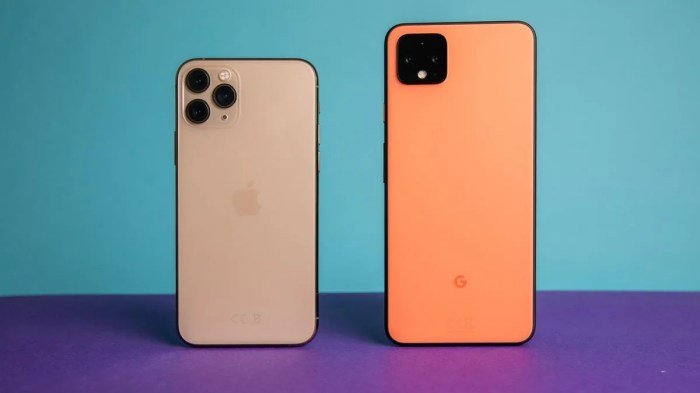Android vs iOS comparison is more than just a tech debate; it’s a battle for the hearts and minds of mobile users worldwide. This in-depth exploration delves into the core philosophies, ecosystems, and user experiences of these two dominant operating systems. We’ll dissect the evolution of Android and iOS, from their inception to their current forms, highlighting their unique strengths and weaknesses.
Prepare to navigate the intricate landscapes of hardware compatibility, app availability, customization options, and security features. From performance benchmarks and software updates to app development and cost analysis, we’ll leave no stone unturned. This comprehensive comparison aims to equip you with the knowledge to make an informed decision about which mobile platform best suits your needs and preferences, offering a compelling guide through the choices that shape your digital life.
Android vs. iOS: A Comprehensive Comparison: Android Vs IOS Comparison

Source: appedus.com
Choosing a smartphone operating system is a significant decision, shaping your digital life. Android and iOS, the two dominant players, offer distinct experiences, each with its strengths and weaknesses. This comparison delves into various aspects, from design philosophies to ecosystem integration, to help you make an informed choice.
Operating System Overview
Android, developed by Google, embraces an open-source philosophy, allowing extensive customization and hardware flexibility. Its history traces back to 2008, quickly gaining popularity due to its openness. iOS, created by Apple, prioritizes a closed-source, tightly controlled environment, focusing on seamless integration within its ecosystem. iOS launched in 2007, emphasizing user-friendliness and consistent performance. The open-source nature of Android enables manufacturers to modify and adapt the OS, leading to a diverse range of devices.
Conversely, iOS’s closed-source model ensures a unified experience across all Apple devices, optimizing performance and security.The UI/UX design principles differ significantly. Android often offers more customization options, allowing users to personalize their experience extensively. iOS emphasizes simplicity and ease of use, with a consistent interface across all devices.
Ecosystem and Hardware
Android’s hardware compatibility is vast, supporting a wide array of devices from various manufacturers, leading to a broader price range. iOS devices are exclusively manufactured by Apple, ensuring tight hardware and software integration. The Google Play Store provides access to a vast library of apps on Android, while the App Store offers a curated selection of apps on iOS.iOS devices benefit from seamless hardware and software integration, resulting in optimized performance and consistent user experience.
Android faces fragmentation challenges due to the diverse range of devices and OS versions.Here’s a comparison of common hardware specifications:
| Feature | Android Device | iOS Device |
|---|---|---|
| Processor | Qualcomm Snapdragon 8 Gen 3 or equivalent | Apple A17 Bionic |
| RAM | 8GB – 16GB | 6GB – 8GB |
| Storage | 128GB – 1TB | 128GB – 1TB |
Customization and Flexibility
Android devices offer extensive customization options, allowing users to personalize their home screens, widgets, and system settings. iOS provides fewer customization options, maintaining a consistent user interface across devices.Users can personalize their Android experience by using custom launchers, widgets, and icon packs. iOS users can customize their home screen with widgets and organize apps but have fewer options for deep system-level modifications.Android’s open-source nature allows for greater user flexibility.
Users can install custom ROMs, modify system files, and sideload apps from various sources.Changing default apps is straightforward on both platforms. On Android, users can select their preferred default apps for web browsing, email, and other functions. iOS allows users to change default web browsers and email apps.Top 5 customization options:
- Android: Custom launchers, widgets, icon packs, system-wide themes, and custom ROMs.
- iOS: Widgets, home screen organization, control center customization, and custom wallpapers.
Security and Privacy, Android vs iOS comparison
Android and iOS both implement robust security features. iOS is known for its strong security measures, with its closed-source nature limiting potential vulnerabilities. Android’s open-source nature allows for rapid security patches, but also exposes it to potential vulnerabilities.Both platforms offer privacy controls, allowing users to manage app permissions, location services, and data tracking. iOS emphasizes user privacy, with features like App Tracking Transparency.
Android provides similar privacy controls, allowing users to manage their data and privacy settings.Both operating systems collect data to improve services, but iOS prioritizes user privacy, with features like end-to-end encryption. Android provides transparency regarding data collection practices.Update frequency impacts security. iOS typically has a faster update cycle, ensuring that security patches are applied quickly. Android updates vary depending on the device manufacturer.Here is a comparative chart highlighting the security strengths:
| Feature | Android | iOS | Notes |
|---|---|---|---|
| Security Updates | Varies by manufacturer | Rapid and consistent | iOS has a faster update cycle |
| App Security | Google Play Protect | App Store review process | Both platforms have app security measures |
| Encryption | Full-disk encryption | Full-disk encryption | Both platforms use encryption to protect data |
| Privacy Controls | Robust privacy settings | Emphasis on user privacy | Both provide privacy controls |
Performance and Efficiency
Performance benchmarks vary depending on the specific devices. Both platforms deliver excellent performance, with high-end devices capable of handling demanding tasks.Optimization impacts battery life. Both Android and iOS focus on optimizing the operating system to improve battery efficiency. iOS devices often have an advantage in battery optimization due to the closed ecosystem.Resource management strategies differ. iOS prioritizes background app management, limiting background activity to conserve battery life.
Android allows for more background processes, which can impact battery life.Processor architecture influences performance. Both platforms utilize advanced processor architectures to optimize performance and efficiency.
Closing Notes
In conclusion, the Android vs iOS comparison reveals two powerful, yet distinct, mobile ecosystems. Android offers unparalleled customization and flexibility, while iOS prioritizes seamless integration and user-friendliness. The ideal choice hinges on your individual priorities, whether it’s the freedom to personalize or the simplicity of a unified experience. Ultimately, both platforms continue to evolve, constantly innovating to provide users with the best possible mobile experience, ensuring the mobile landscape remains dynamic and competitive.
